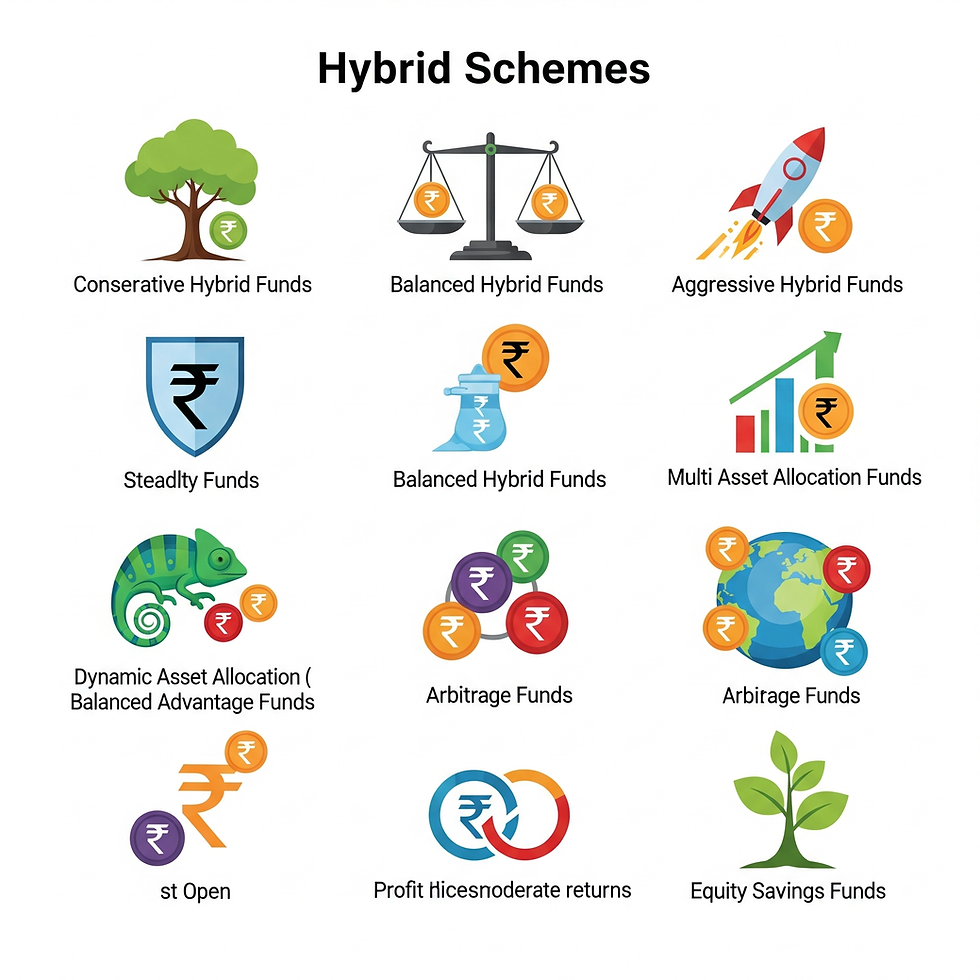Bacche bade ho gaye hai
- M Manohar Rao
- May 15, 2025
- 4 min read

Tags: Wealth Management, Investment Lesson, Mutual Funds, Stock market, Budget, Finance, Investing, Personal Finance, Investment
The Change
Mutual funds with less than 35% investments in domestic equities are expected to attract short term capital gains tax under the amendment to the Finance Bill 2023. Accordingly, unitholders of these mutual fund schemes would be taxed as per their respective tax slabs.
The current taxation of 20% with indexation benefit for a holding period of above three years in non- equity oriented funds would cease to exist for fresh investments under the new tax rules from April 1, 2023.
Applicability of Tax on Mutual Fund Scheme w.e.f. April 1, 2023

Background
All parents go through the cycle of nurturing infants and babies, pampering and disciplining kids and teenagers with one end objective – make them capable to stand-up on their own and face the opportunities and challenges the world presents in adulthood.
Likewise, it is the role of government to support and aid sunrise industries and help them gain critical acceptance, experience, and scale. Ultimately the scaffolding must come off when the structure is robust, and growth is inevitable.
Through the decades such support to the mutual fund industry was provided through either tax exemptions/ deductions or preferential taxation. Over time these tax benefits and including the latest change for fixed income funds, were either curtailed or withdrawn.
Bachhe bade ho gaye
While one can argue that the mutual fund industry still has very low penetration in India, it is now one of reasonable and respectable size at approximately INR 40 lakh crores (22% of bank deposits and 74% of Insurance industry assets). Withdrawal of the current taxation regime is another layer of the scaffolding coming off.
Immediately the tax changes appear as a big blow, however, as with past changes, the impact will only be short term - Bachhe ab bade ho gaye hai, Ab khud apne pairo par khade rahenge (The children have grown up, now they will take care of themselves). Here’s why.
Not the first tax benefit to be withdrawn
The introduction of dividend distribution tax (DDT) and subsequent increase in DDT levels was supposed to be the soft burial of liquid funds. Today that category continues to thrive with over INR 5.5 lakh crores. (Source: AMFI, Monthly AAUM as on Feb 2023)
Core benefits and choice
Core advantages of fixed income funds remain - professional management, liquidity, diversification and ease of transacting. Most importantly a wide choice of funds to match ones’ time horizon for investment and appetite for credit risk.
More importantly fixed income funds allow ease of participation in bond markets, particularly when yields are stable with accrual as the primary source of return or when interest rates fall and the ability to participate in gains in bond prices.
Holding periods will increase not decrease
Outside of liquid funds and monies invested for shorter periods (6 months to 24 months), the holding periods in other categories of fixed income funds were aligned to availing tax benefits (3years+). Hereafter, like in equity funds, investors will tend to hold on to investments till they need the monies. Any redemption will create a tax incidence at marginal rates. Thus, holding periods will be aligned to cash flow requirements rather than tax-efficiency periods
Swimming with and not against the tide
Immediate reaction in the marketplace is that investments will move to fixed deposits. A comparison of Fixed Deposit (FD) rates with current yields in fixed income funds helps realize that for very small and specific time buckets FD rates come close to the fund yields. And while an investor has the choice of certainty of fixed and known returns from FDs, they also realize the potential gain from investments in the fixed income mutual funds when interest rates come down as the interest cycle changes direction.
Disclaimer:
The information set out above is included for general information purposes only and is not exhaustive and does not constitute legal or tax advice. All complaints regarding Mutual Fund can be directed towards visit www.scores.gov.in (SEBI SCORES portal). Readers are requested to make informed investment decisions and consult Chaitanya Financial Consultants – 9000628943 / mfd.mmr@gmail.com to determine the financial implications with respect to investing in Mutual Funds.
Mutual Fund investments are subject to market risks, read all scheme related documents carefully.
Join WhatsApp group for better and personalised communication regarding investment lessons, advice and help.
Note: Members of our WhatsApp group will enjoy lifetime free investment advice and will not be charged any consultation fee for mutual fund investments.
Support My Mission – Your Small Contribution Matters!
I am passionate about sharing financial knowledge and guiding people toward financial independence. Through my articles, I strive to provide valuable insights that can help you make smarter investment decisions and secure your future.
If my work has added value to your financial journey, I would truly appreciate your support. A small contribution from you—whatever amount you feel is right—will go a long way in motivating me to continue creating high-quality content.
💰 You can support me via:
✔ Paytm / Google Pay / Amazon Pay: 9000628943
✔ PayPal: manomatt@rediffmail.com
Every small payment is not just financial support—it’s an encouragement that fuels my passion for educating and empowering others. Thank you for being a part of this journey! 🙏
Here’s your chance to earn extra money effortlessly. Simply refer someone to invest in any mutual fund scheme, and as soon as they invest, you'll receive ₹100 - ₹200 instantly in your bank account via Paytm or PhonePay. Start referring and start earning today!



Comments